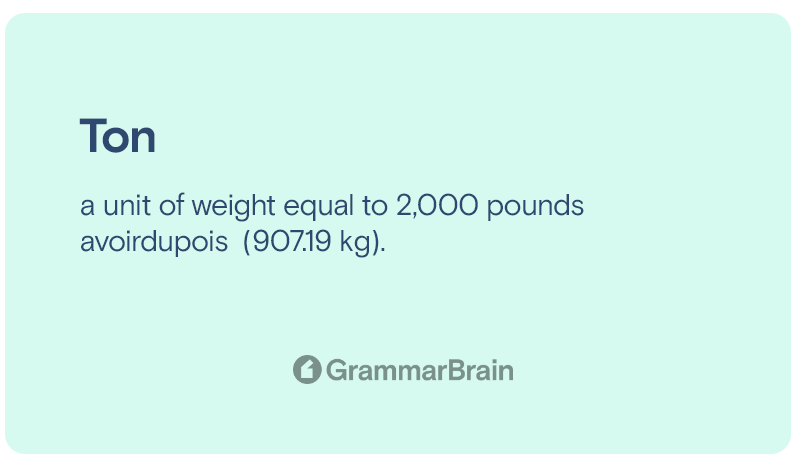Ton and tonnes are used in British and American English, respectively. Since “tonnes” is the plural form of “ton” in American English, only your variant can be used. In America, a ton is a unit of measurement equal to 2,000 pounds. But that doesn’t mean the correct structure isn’t “tonnes.”
A “tonne” is a whole different unit of measurement. Both “ton” and “tonne” are units of weight. However, a “ton” is an imperial measure, and a “tonne” is a metric measure. A “ton” is equal to 1,000 kilograms. So, it’s possible that a “metric tonne” may be mentioned in the US.
However, they cannot be substituted for one another. The recognized International Weight System assigns each one a unique weight, referring to a tonne as a megagram equivalent to 1,000,000 grams or 1,000 kilograms.
Both British and American spellings of the word “tonne” are used. To avoid using it carelessly, 2,240 pounds (1,016.047 kilograms) equal one British tonne. The term “long tonne,” “weight tonne,” or “gross tonne” are also occasionally used to describe it.
| Weight | Definition |
| Ton | a unit of weight equal to 2,000 pounds avoirdupois (907.19 kg). |
| Tonnes | another term for metric ton. |
Which Is Right: Tons or Tonnes?
A ton is an estimated unit in American English equivalent to 2,000 pounds. A ton becomes 2,240 pounds in assessments conducted outside the United States. A ton, often known as a metric ton, is a mass measurement that goes up to 1,000 kilograms.
Because most Americans speak basic English, the spelling is rarely used in U.S. distributions. In other places, complicated distributions use accurate spellings for the estimate units. Additionally, “ton” is used informally to refer to something significant in degree, total, or quantity.

If remembering the variations between American and British English wasn’t difficult enough, the disparities between American and British assessment frameworks can be frustrating.
Use of Ton
A ton is a measure of weight. In contrast to the rest of the world, Americans measure practically everything uniquely, and weight is no exception. A ton, often known as a short tonne, weighs 2,000 pounds in America.
Most other developed nations have normalized using the so-called metric tonne around the decimal standard. One kilogram equals one metric ton. A metric tonne, which equals 2,204.6 pounds, is more critical than a U.S. ton.
Use of Tonnes
Tonnes is an optional spelling that represents a metric tonne. Although it is rarely used in American English, it is widely used outside the country.
A tonne, often known as a metric tonne, is a measurement unit equal to 1,000 kilograms. In addition, a tonne is more critical than a U.S. tonne.
How to Recognize The Use of Tons And Tonnes
It’s an excellent opportunity to recollect the best ways to spell it now that we’ve discussed where the term variety originates. As we mentioned before, the “tonne” is used frequently outside the US. Moreover, it is advantageous to remember it.
The “tonne” is heavier and maybe the simplest method to remember what’s important. In addition, you can attribute that to its weight because it is a two-letter longer word.
Final Thoughts
The units of measurement, ton, and tonnes, are the same.
- A tonne in the US weighs 2,000 pounds.
- A metric tonne, 1,000 kilograms, or 2,204.6 pounds can all describe a tonne outside the United States.
- The term “metric tonne” is also known as “tonne.” It is simple to remember these words since tonne is used in the U.K., it finishes in NE, and the U.K. is NE of the US.
Inside this article
Fact checked:
Content is rigorously reviewed by a team of qualified and experienced fact checkers. Fact checkers review articles for factual accuracy, relevance, and timeliness. Learn more.
Core lessons
Glossary
- Abstract Noun
- Accusative Case
- Anecdote
- Antonym
- Active Sentence
- Adverb
- Adjective
- Allegory
- Alliteration
- Adjective Clause
- Adjective Phrase
- Ampersand
- Anastrophe
- Adverbial Clause
- Appositive Phrase
- Clause
- Compound Adjective
- Complex Sentence
- Compound Words
- Compound Predicate
- Common Noun
- Comparative Adjective
- Comparative and Superlative
- Compound Noun
- Compound Subject
- Compound Sentence
- Copular Verb
- Collective Noun
- Colloquialism
- Conciseness
- Consonance
- Conditional
- Concrete Noun
- Conjunction
- Conjugation
- Conditional Sentence
- Comma Splice
- Correlative Conjunction
- Coordinating Conjunction
- Coordinate Adjective
- Cumulative Adjective
- Dative Case
- Determiner
- Declarative Sentence
- Declarative Statement
- Direct Object Pronoun
- Direct Object
- Diction
- Diphthong
- Dangling Modifier
- Demonstrative Pronoun
- Demonstrative Adjective
- Direct Characterization
- Definite Article
- Doublespeak
- False Dilemma Fallacy
- Future Perfect Progressive
- Future Simple
- Future Perfect Continuous
- Future Perfect
- First Conditional
- Irregular Adjective
- Irregular Verb
- Imperative Sentence
- Indefinite Article
- Intransitive Verb
- Introductory Phrase
- Indefinite Pronoun
- Indirect Characterization
- Interrogative Sentence
- Intensive Pronoun
- Inanimate Object
- Indefinite Tense
- Infinitive Phrase
- Interjection
- Intensifier
- Infinitive
- Indicative Mood
- Participle
- Parallelism
- Prepositional Phrase
- Past Simple Tense
- Past Continuous Tense
- Past Perfect Tense
- Past Progressive Tense
- Present Simple Tense
- Present Perfect Tense
- Personal Pronoun
- Personification
- Persuasive Writing
- Parallel Structure
- Phrasal Verb
- Predicate Adjective
- Predicate Nominative
- Phonetic Language
- Plural Noun
- Punctuation
- Punctuation Marks
- Preposition
- Preposition of Place
- Parts of Speech
- Possessive Adjective
- Possessive Determiner
- Possessive Case
- Possessive Noun
- Proper Adjective
- Proper Noun
- Present Participle
- Prefix
- Predicate



